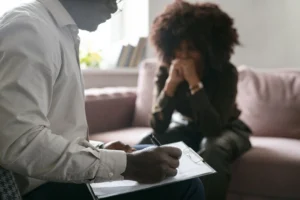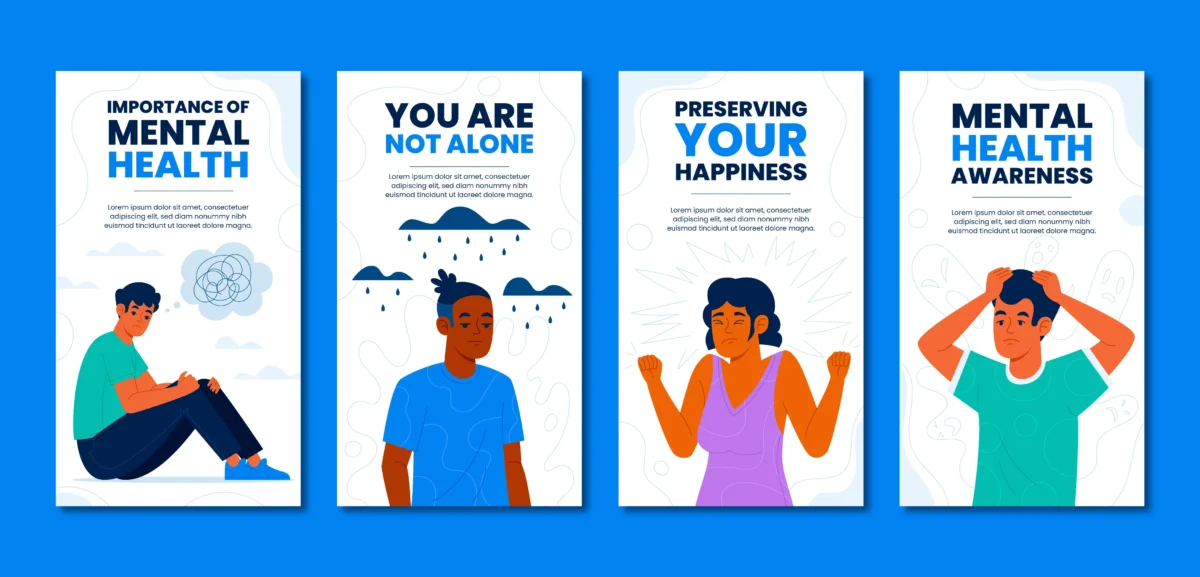By Jennifer Bailey, LCSW; LICSW-CP; RDT
From August 1619 to December 1865, the enslavement of Black people played a crucial role in the American economy, providing a lucrative foundation of wealth and status for the United States of America (Jim Crow Museum). For 246 years, Black people endured physical, sexual, and psychological trauma during slavery. Despite that Black people established a culture and identity that evokes hope and perseverance. Black people worked for freedom in the Underground Railroad and marched on Washington to fight segregation. The Black community knows how to come together when it matters, so why are we avoiding mental health?
Results from Substance Abuse and Mental Health Services Administration’s (SAMHSA) 2020 National Survey on Drug Use and Health found that 19.7% of Black adults experienced a mental health condition. 6.6% of Black and African American adults have experienced a major depressive episode (SAMHSA). Also in 2022, suicide was the third leading cause of death for Black or African Americans ages 10 to 24, according to the US Department of Health and Human Services Office of Minority Health (OMH). There is a need for mental health support within the Black community. However, Black people aren’t seeking help. According to McLean Hospital, about 25% of Black people go to therapy compared to 40% of white people.
Barriers Keeping Blacks from Going To Therapy
For this article, I received insight on what is keeping the Black community from therapy from two mental health professionals who are also people of color, Caroline Sanders and Claude L. King.
“These [barriers] include stigma in seeking treatment, historical trauma and mistrust of the health care system, financial constraints, and health care providers who lack cultural competency,” said Caroline M. Sanders, a Licensed Clinical Professional Counselor (LCPC). She provides therapy to individuals from various backgrounds who come to her for support.

Stigma
Merriam-Webster defines stigma as “a set of negative and unfair beliefs that a society or a group of people have about something.” In this case, the group is Black people, and the “something” is going to therapy.
“Many still believe that seeking therapy means you’re ‘crazy,’ or that you’re admitting there’s something fundamentally wrong with you,” said Claude L. King, a licensed clinical professional counselor (LCPC). “This belief system can make people feel ashamed for even considering therapy, reinforcing the idea that mental toughness means suffering in silence. Combating these internalized stigmas is essential for increasing access and utilization of mental health services in our community.”
King provides individual therapy and assists athletes in improving their performance. In short, Black people are concerned that if they get therapy, they’re crazy. Perhaps individuals who would want to receive therapy hesitate because they could feel as though they aren’t “Black enough.”
Underrepresentation
The majority of therapists, at 73%, are white, leaving 27% of therapists of color. Of that 27%, only 4% are Black or African American according to Counseling Psychology.org.
“One of the most significant [barriers] is the underrepresentation of Black clinicians. We all want to speak with someone we feel safe and comfortable opening up to,” King added. “The value of sitting with someone who inherently understands the nuances of your experiences, without needing extensive explanation, is invaluable. That level of cultural resonance and trust can make the difference between someone committing to therapy or walking away from it altogether.”
Affordability
In 2023, 12.5% of Black individuals were uninsured according to the health policy organization KFF. King explained how being uninsured makes the affordability of therapy more difficult. “For Black individuals without health insurance, paying out-of-pocket can be expensive. Therapy sessions can range from $75 to $200 per session, and weekly, this is simply not feasible for many, especially if they are earning minimum wage, supporting a family, or dealing with other financial stressors like housing, food, or childcare.”
Breaking Down Barriers
Discussing mental health will help normalize it, which will decrease the stigma around the issue.
“There is real power in hearing a friend, colleague, or family member share their struggles with stress, trauma, or relationship issues and the steps they are taking to address them,” said King. “These conversations can destigmatize help-seeking behavior and reinforce the message that it’s okay to not be okay, and it’s courageous to seek help.”
“Educating members of the Black community about the benefits of therapy is the first step in encouraging individuals to seek treatment,” Sanders added.
Community outreach from trusted community leaders could shift individuals’ negative connotations around seeking mental health support. “These venues can serve as a safe environment that acknowledges and addresses stigma and the historical trauma experienced by Black Americans,” said Sanders.
To address these issues, King proposes expanding Medicaid, increasing funding for community mental health clinics, and requiring insurance companies to cover mental health services at parity with physical health care.
The Black community is synonymous with hope, change, and togetherness. It’s time that we use these qualities to break down the barriers that are keeping people in the Black community and other people of color from accessing mental health support.
Takeaways
- The Black community is not going to therapy.
- Stigma: The idea that therapy is for “crazy” people and we should handle things on our own.
- Underrepresentation: 4% of therapists are Black. Speaking to someone who one feels understands the experience is imperative to the relationship between client and therapist.
- Affordability: A lack of insurance makes therapy hard to afford.
- To break down the barriers, we must have conversations about mental health to break down stigma.
- Implementing policies that support community mental health agencies and to provide affordable therapy services will increase accessibility.
Jennifer Bailey is a wife, mother of three, a Licensed Clinical Social Worker (LCSW) and a Registered Drama Therapist (RDT).




